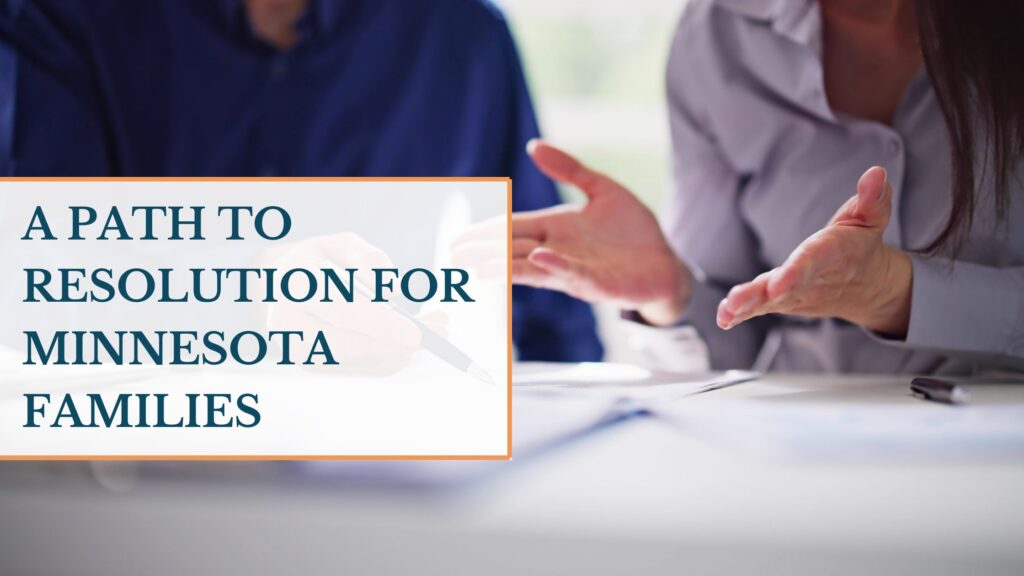
When facing family law disputes, the thought of going to court can be overwhelming. Courtroom battles often involve stress, high costs, and public exposure. However, mediation offers a more peaceful, private, and cost-effective way to resolve these disputes. For families in Duluth, MN and the surrounding area, mediation can be a valuable alternative to litigation in cases involving divorce, child custody, support, and the division of assets.
But what exactly is mediation, and why might it be a good option for your family?
What is Mediation?
Mediation is a process in which a neutral third party, known as a mediator, helps two or more parties in conflict work together to reach a mutually agreeable solution. The mediator doesn’t take sides or offer legal advice but facilitates communication, helping each party express their concerns and understand the other’s perspective. In family law, mediation can be used to resolve issues such as:
- Legal and physical custody of children
- Parenting time or physical placement
- Child support
- Spousal maintenance (alimony)
- Division of marital assets and debts
Why Choose Mediation Over Litigation?
In a courtroom, a judge makes decisions based on limited information and the law, often leaving both parties feeling unsatisfied. Mediation, on the other hand, allows the people involved to retain control over the outcome. Here are several key benefits of mediation:
1. Privacy and Confidentiality
Court cases are public records, meaning anyone can access the details of your dispute. Mediation, however, is confidential. What happens in mediation stays private, allowing you to keep sensitive family matters out of the public eye.
2. Control Over the Outcome
Judges can only make rulings based on the law, which may not fully reflect your family’s unique needs and circumstances. In mediation, the parties involved have the power to craft solutions that best fit their situation. Whether it’s determining a flexible parenting schedule or agreeing on how to divide assets, mediation gives you control.
3. Cost-Effective and Time-Efficient
Mediation is typically much faster and less expensive than going to court. Court cases can drag on for months or even years, while mediation sessions are usually scheduled at the parties’ convenience and can sometimes resolve issues in a matter of hours. By avoiding long legal battles, families save both time and money.
4. Less Stressful and Contentious
Litigation can be emotionally draining, especially for families with children. Mediation offers a less adversarial approach, encouraging cooperation and reducing the emotional toll on everyone involved. For co-parents, it also sets a positive tone for future communication and decision-making.
What Can Mediation Help Resolve?
Mediation is a flexible process that can be used to address a variety of family law issues. Common disputes that can be resolved through mediation include:
- Child Custody and Parenting Time: Mediation allows parents to develop a parenting plan that works best for their children and their own schedules, avoiding the need for a judge to make this critical decision.
- Child and Spousal Support: By discussing financial needs and resources, parties can agree on support arrangements that make sense for everyone involved.
- Division of Property: Whether it’s dividing the family home, vehicles, or retirement accounts, mediation can help couples find fair solutions that avoid drawn-out legal battles.
Is Mediation Right for You?
Mediation is a voluntary process, meaning no one can force you to participate. However, it is often encouraged by family courts, and many judges prefer to see parties resolve their disputes amicably before seeking a legal ruling. Mediation can be particularly effective when both parties are willing to come to the table with open minds and a commitment to finding common ground.
That said, mediation may not be appropriate in all situations. If there has been a history of domestic violence or if one party refuses to engage in good faith, mediation might not be the best option. In such cases, legal representation and court intervention may be necessary.
How to Prepare for Mediation
Preparing for mediation is key to making the process successful. Here are a few tips for getting ready:
- Gather Documents: Before the session, gather any relevant documents such as financial statements, parenting schedules, or property records.
- Know Your Priorities: Think about your goals for mediation and what outcomes are most important to you. It’s helpful to prioritize issues to focus on during the session.
- Stay Open-Minded: Mediation requires compromise. Be prepared to listen to the other party’s concerns and be willing to explore creative solutions that work for both sides.
What Happens After Mediation?
If both parties reach an agreement in mediation, the terms will be written up in a Memorandum of Agreement, which both parties will sign. This agreement can then be submitted to the court for approval. Once the judge adopts the agreement, it becomes a legally binding court order.
If mediation does not result in a resolution, the parties are still free to pursue their case in court. However, many judges strongly favor upholding agreements reached in mediation as they tend to be more practical and mutually acceptable.
Final Thoughts
Mediation offers a way to resolve family law disputes in a private, efficient, and less confrontational manner. By focusing on collaboration rather than conflict, mediation allows families to maintain control over their future and find solutions that meet their unique needs. Whether you’re facing a divorce, custody battle, or financial dispute, mediation may be the key to a smoother resolution.
If you’re considering mediation for your family law case in Northern Minnesota or Wisconsin contact our office today to learn more about how this process can work for you. We’re here to guide you through every step of the journey toward a peaceful resolution.

